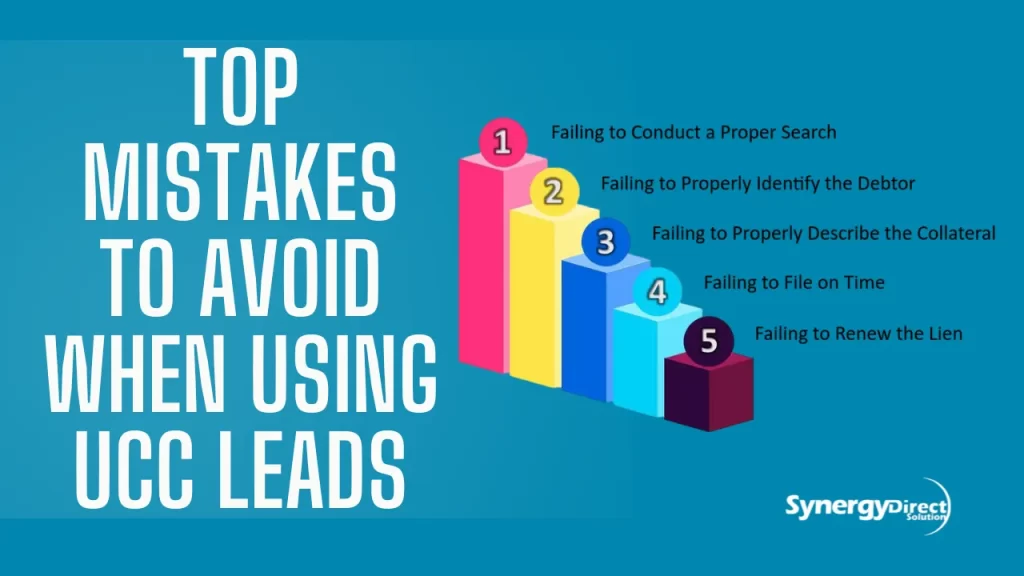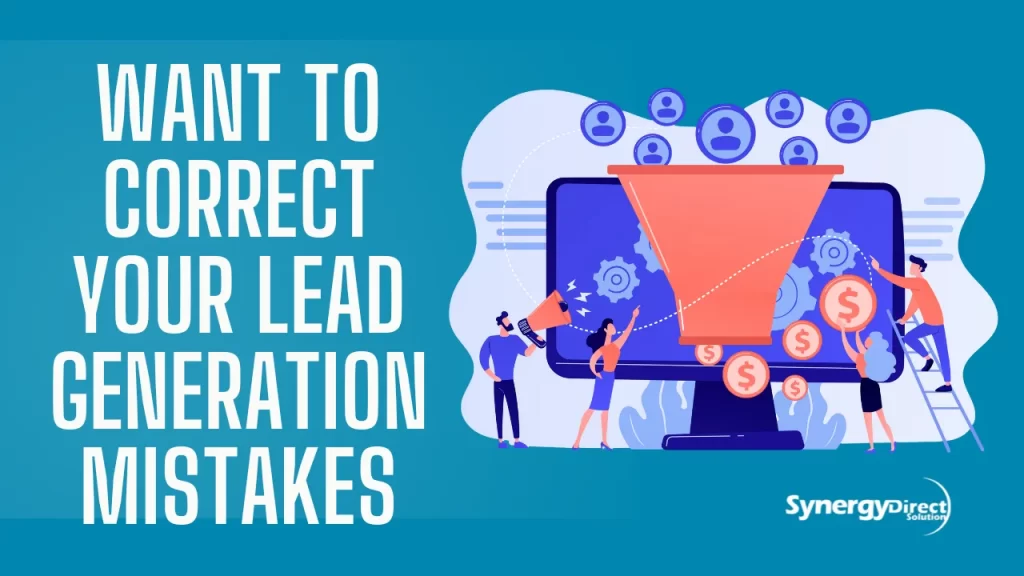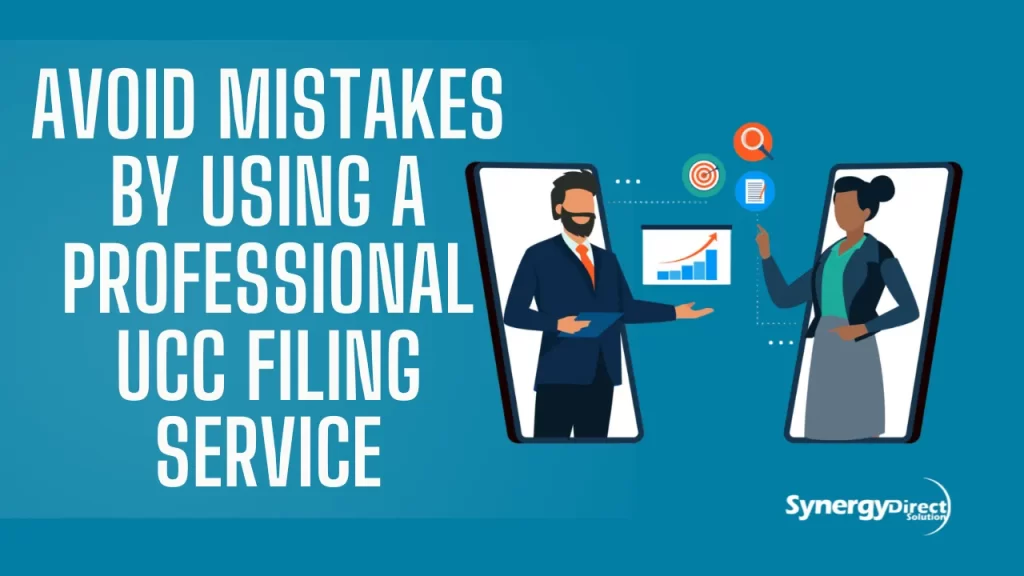Top Mistakes to Avoid When Using UCC Leads
In the competitive world of business finance and merchant cash advances (MCAs), UCC leads (Uniform Commercial Code leads) offer one of the most direct ways to reach businesses already engaged in financial transactions. These leads help identify companies who have filed or are involved in secured lending activities, often signaling a need for additional capital or refinancing.
However, simply acquiring UCC leads isn’t enough to guarantee sales success. Many businesses make critical mistakes when handling these leads, resulting in wasted time, money, and lost opportunities. This guide outlines the top mistakes to avoid when using UCC leads, ensuring your marketing and sales efforts are both strategic and successful.

What is Lead Generation?
Lead generation is the process of attracting and converting potential customers—known as leads—into individuals or businesses interested in your product or service. It serves as the foundation of a successful sales funnel by identifying prospects who are most likely to become paying clients.
Typically, lead generation involves a variety of marketing strategies such as content marketing, social media advertising, email campaigns, SEO, and paid ads, all aimed at capturing interest and contact information from potential buyers. Once collected, these leads are nurtured through targeted communication, follow-ups, and personalized offers until they are ready to make a purchase.
In today’s digital landscape, effective lead generation combines both inbound and outbound methods to build a sustainable pipeline of qualified prospects, ensuring consistent business growth and higher conversion rates.
8 common mistakes to Avoid When Using UCC Leads
Below are the top eight mistakes companies make when generating leads.
1. Buying Email Lists
Purchasing email lists might seem like a quick fix to grow your contact base, but it often backfires. These recipients haven’t opted in, and many may mark your emails as spam, hurting your sender reputation. Instead, focus on growing your list organically and provide value to retain subscribers.
2. Writing Ineffective Blog Posts
Blog posts should educate, answer questions, and include clear calls-to-action (CTAs). Posts that don’t engage or guide readers toward a next step (like contacting your business) fail to convert traffic into leads.
3. Neglecting Lead Generation Tools
Using tools like call tracking, click-to-call buttons, and online forms helps you understand user behavior and gather contact information efficiently. Not using these tools means missing out on valuable insights and potential leads.
4. Using Only One Approach
Relying on a single lead generation strategy limits your reach. Different products and services may require tailored approaches, such as combining blogs for awareness and emails for nurturing existing leads.
5. Failing to Nurture Leads
Capturing a lead isn’t enough—you must follow up promptly. Without timely responses, leads may lose interest or choose a competitor. Lead nurturing is essential to move prospects through the sales funnel.
6. Ignoring the Buyer Journey
Not every lead is at the same decision-making stage. Some need education, while others are ready to buy. Treating all leads the same may result in missed opportunities. Customize your content and offers based on where each lead is in their journey.
7. Misusing Social Media
Posting inconsistently or without strategy can reduce your social media’s impact. Platforms like Instagram and TikTok can boost visibility, but only if used with purposeful content that connects with your audience and directs them to take action.
8. Making Online Forms the Wrong Length
If your contact forms are too long or too short, they may deter users or fail to collect useful data. Test different form lengths and formats to see which versions lead to better completion rates and higher-quality leads.
Not segmenting by industry or state
Not segmenting by industry or state can limit a business’s ability to effectively target its ideal audience and meet specific market needs. When companies overlook the importance of segmentation, they risk missing out on tailored marketing strategies that resonate with the unique characteristics of different industries or geographic locations.
By failing to break down their audience into smaller, more manageable segments, businesses may struggle to address the distinct preferences, pain points, and behaviors of potential customers. Without segmentation, efforts can become too generalized, leading to wasted resources and missed opportunities.
This is particularly critical in sectors where local preferences or industry-specific challenges play a significant role in consumer decision-making. Therefore, strategically segmenting by industry or state ensures that marketing initiatives are more focused, relevant, and effective.
Want to correct your lead generation mistakes?
If your lead generation efforts aren’t producing the results you expected, it’s likely due to common and avoidable mistakes. Many businesses struggle with unclear targeting, lack of segmentation, inconsistent messaging, or poor follow-up processes. Correcting these issues starts with identifying where leads are dropping off or disengaging.
Are you offering real value in your content? Is your messaging aligned with your audience’s pain points? Are you following up at the right time, on the right channel? By analyzing your lead generation funnel step-by-step, making data-driven adjustments, and leveraging tools like CRM systems and automation, you can significantly improve your results. Small corrections can lead to major improvements when they’re rooted in a deep understanding of your audience and their buying behavior.

Poor script usage or follow-up process
Even the best leads can go cold quickly if your outreach script is weak or your follow-up strategy is inconsistent. Poor script usage often results in robotic, unengaging conversations that fail to establish trust or demonstrate value. Whether it’s a cold call, email, or SMS, a script that lacks personalization or clarity can make prospects tune out instantly.
On the other hand, even with a solid opening, failing to follow up in a timely, strategic manner means missing out on valuable opportunities. Many businesses stop after one attempt or follow up too aggressively, which can annoy potential clients.
The key is to use a flexible, value-driven script and implement a structured follow-up process with the right timing, frequency, and channel. By improving both your messaging and your follow-up discipline, you significantly increase your chances of turning a lead into a conversion
Common Mistakes to Avoid when Leveraging
When leveraging tools or strategies to drive business growth, many teams unknowingly fall into common traps that undermine their results. One major mistake is over-relying on automation without maintaining a human touch—this can make interactions feel impersonal and reduce trust.
Another pitfall is failing to align new tools with clear goals or workflows, leading to inefficiency rather than improvement. Additionally, businesses often adopt solutions without proper training, causing miscommunication or underutilization.
Data overload is another challenge; without a clear analysis plan, valuable insights get lost in the noise. To avoid these issues, businesses must ensure they’re leveraging tools purposefully—matching them to their unique goals, training staff effectively, and constantly optimizing based on real-world results.
Avoid mistakes by using a professional UCC filing service
Filing a Uniform Commercial Code (UCC) statement may seem straightforward, but errors in the process can have serious legal and financial consequences. Mistakes such as incorrect debtor information, misidentified collateral, or filing in the wrong jurisdiction can render a filing invalid—potentially jeopardizing your secured interests.
A professional UCC filing service helps mitigate these risks by ensuring that all details are accurately completed, deadlines are met, and the proper filing protocols are followed in each state. These services are familiar with evolving regulations and can navigate complex filings with precision, saving you time and reducing liability. By relying on experts, businesses can focus on their operations while maintaining confidence that their UCC filings are properly handled from start to finish.

Conclusion
Successfully using UCC leads to growing your business requires more than just acquiring a list—it demands a strategic, informed approach. From segmenting by industry and avoiding outdated data to refining scripts and ensuring legal compliance, every step matters. By steering clear of common mistakes like poor follow-up, ineffective tools, and improper UCC filings, your team can unlock the true potential of UCC leads and turn cold data into qualified prospects. Remember, the key to high-converting lead generation lies in consistency, personalization, and precision. When managed correctly, UCC leads become a powerful engine for business growth and long-term success.
FAQS
Q1: Why is simply acquiring UCC leads not enough for success?
A1: Acquiring UCC leads is only the first step—success requires a strategic and informed approach. Without proper segmentation, follow-up, personalization, and legal compliance, even high-quality leads can go cold or be mishandled, resulting in lost opportunities and wasted resources.
Q2: What are the risks of poor follow-up processes when using UCC leads?
A2: Poor follow-up can lead to disengaged prospects and missed conversions. Many businesses either fail to follow up at all or do so too aggressively, which can annoy potential clients. A consistent, timely, and value-driven follow-up strategy is crucial to converting leads.
Q3: How does segmenting by industry or state improve UCC lead targeting?
A3: Segmenting by industry or state allows businesses to tailor their messaging and offers based on specific needs, preferences, and challenges of different market segments. This leads to more relevant outreach, better engagement, and higher conversion rates.
Q4: Why should businesses use a professional UCC filing service?
A4: Filing UCC statements incorrectly can result in legal issues and invalid claims. A professional filing service ensures accurate details, timely submissions, and compliance with state-specific regulations, reducing risk and ensuring the business’s interests are legally protected.
